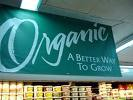
Some people immediately dismiss going organic because they believe the cost is too much. Though most organic products are more expensive than other foods (because of many farming practices, including the fact that organic farmers don’t get government subsidies), that is not always true. In fact the organic navel oranges we buy from a national natural health food chain are comparable to the non-organic oranges at our local traditional chain grocery store. Like you seek to get the best deals at your regular grocery store, you have to seek to get the best deals on organic items, if eating chemical-free and non-genetically modified foods is that important to you. You must do the cost-benefit analysis, often looking long-range, like considering how much you may have to pay to treat an illness you’re likely to get years from now from eating pesticide-laden food (Organic.org). I’m not trying to scare you; I just want you to be aware that many illnesses we see today are the result of the nutrient-deficient and chemical-rich foods we consume. With a little effort, you can decrease your toxic intake and your chance of developing disease.
Follow these tips:
1. Prioritize your budget. Do you really have to get your hair and nails done as often as you do? How many times a week do you eat out, either as a family or buying lunch at work? Do you drink coffee and soda pop more than once a week? What other snacks do you eat often? Find those items in your budget that are not necessities and use the money you save to buy organic.
2. Buy products with less than 100 percent organic ingredients. This won’t work with produce, but you can get packaged foods, like pasta sauces and crackers, that are made with some organic ingredients. In fact, there are four levels of organic labeling that you will find at the grocery store: 100% Organic—those made with 100 percent organic ingredients; Organic—Those made with at least 95 percent organic ingredients; Made With Organic Ingredients—Products that have at least 70 percent organic ingredients with strict restrictions on the remaining 30 percent, including no GMOs (genetically modified organisms); and Other—Products with less than 70% organic ingredients may list organically produced ingredients on the side panel of the package, but may not make any organic claims on the front of the package” (Organic.org).
3. Shop at a farmers’ market. Late spring to early fall is a great time to get fresh and locally grown produce. Some farmers who sell here have been certified as having organic products. Others may not have gone through the process to become certified but don’t use harmful chemicals to grow and preserve their foods. If you go late in the day you often get to haggle with sellers to get reduced prices on already competitive products. Click here to find one in your area.
4. Join a food cooperative (co-op). Some natural food grocery stores run cooperatively, where workers and/or customers own and operate the store. Membership fees allow owners to collectively purchase organic items from farmers, getting a better price on organic items (usually a smaller selection) than those carried in traditional markets. Anyone can shop at a co-op but only members get a discount on shelf prices. Food cooperatives can also be in the form of a buying club, where members’ collective monies help to buy products from a local farm and members pick up their own items at a designated location. Click here to find a food cooperative in your area.
5. Join a farm cooperative. Officially known as a Community Supported Agriculture (CSA) program, a CSA allows the public to buy food directly from a farmer, some of which grow organic products. You pay a fee, or a share (a.k.a. a membership or subscription), to receive a weekly box of vegetables and sometimes other farm produce, like eggs, meat and cheese. Read here for more information on CSAs and where to find one in your area.
6. Grow your own food. You can plant your own garden to supplement what you get at the store. The cost for seeds is minimal and you get the joy of cultivating and collecting food that you know doesn’t have any harmful chemicals.
7. Mail order organic items. If organic food is limited where you live, you can mail order, though this is more expensive than organic products in the stores. There may be one or two items that you would love to have and can’t get locally so this still may be a viable option.
With these tips, I know there is at least one way you can incorporate organic products in your budget. Doing so will preserve the environment and your body, making you a good steward over that which God has entrusted you and giving you bodily strength to do the necessary work to build His Kingdom.
Copyright 2011 by Rhonda J. Smith


